In line with the Central Bank of Kuwait’s directives to enhance financial security and reduce the risks associated with fraud and illegal transactions, and in line with the Kuwait Banking Association and Kuwaiti banks’ commitment to protecting banking sector customers and preserving their funds and property, the Association cooperated with the relevant authorities, namely the Ministry of Interior and the Public Prosecution, to establish a virtual central room to address electronic financial fraud in Kuwait with the necessary efficiency and speed.
On this occasion, the Secretary-General of the Kuwait Banking Association, Prof. Yaqoub Al-Sayed Yousef Al-Rifaei, stated that the virtual central room began operating in December 2023, according to precise and clear procedures agreed upon by all participating stakeholders, ensuring rapid and continuous coordination and cooperation around the clock.
Al-Rifaei explained that the room receives customer reports, monitors all electronic fraud operations with the aim of combating them, and takes the necessary precautionary measures to ensure their non-recurrence.
This is part of the Association’s and Kuwaiti banks’ efforts to combat such activities. It also monitors and restricts suspicious accounts, tracks and seizes funds. Al-Rifai indicated that the virtual central chamber aims to enhance coordination between the banking sector and official authorities to combat electronic financial fraud in the State of Kuwait by integrating the expertise of all relevant parties.
This contributes to providing a safe environment for customers and protecting their assets. It also contributes to raising customer awareness about fraud methods and how to avoid them through ongoing awareness campaigns. In a related context, Al-Rifaei indicated that a specialized working group has been formed, comprised of all Kuwaiti banks, to study and analyze fraudulent operations detected by the central chamber, identify the target groups, channels used, and fraudulent methods employed.
The specialized team from the banks aims to study financial fraud operations and publish content to raise awareness of the latest methods and techniques of electronic financial fraud and how to combat it through the various social media platforms of the Central Bank of Kuwait, the Kuwait Banking Association, Kuwaiti banks, and the accounts of the national awareness campaign “Let’s Be Aware.”
Al-Rifaei emphasized that the virtual central room follows a set of procedures to ensure the effectiveness and efficiency of its operations. These procedures begin by receiving customer reports of electronic financial fraud via multiple platforms, such as telephone, email, and websites. Subsequently, thorough investigations and comprehensive analysis of the reports are conducted to determine the validity of the report and identify the fraudulent methods used. The room cooperates with official authorities to track and seize suspicious funds and ensure appropriate legal action is taken. This contributes to providing a safe and transparent financial environment for customers.
It is worth noting that since its establishment in December 2023, the room has achieved several important accomplishments that have enhanced financial security in the State of Kuwait. It has contributed to strengthening coordination between banks and official authorities, leading to improved speed and efficiency in handling financial fraud reports. The Chamber also succeeded in monitoring and restricting numerous suspicious accounts, contributing to the protection of customer assets and reducing fraud. In addition, specialized teams were formed to study and analyze financial fraud, which contributed to the development of effective strategies to combat it.
In addition, extensive awareness campaigns were launched across social media platforms, which increased community awareness on the subject and helped customers take appropriate preventative measures, significantly reducing the number of fraud cases to which they were exposed.
Al-Rifaei pointed out that the most common forms of fraud include electronic banking fraud, which involves stealing bank card data and using it illegally. Fraud via text messages and phone calls, where fraudsters pretend to represent banks or government agencies to steal personal information, is also common. Fraud via fake links, where messages contain fake links to websites that look like official websites, tricking users into entering their personal information. Phishing, which involves sending emails that appear to be official, involves stealing bank account information. Investment fraud, which promotes fake investment projects promising imaginary profits to attract victims, is also common. Finally, identity theft, which involves using someone else’s data to open accounts or conduct illegal transactions, is common.
Among the most prevalent fraud methods currently are fraud via social media applications such as WhatsApp and Instagram, which request money transfers under the pretext of necessity or fake offers. Fraud via fake ads promoting non-existent goods or services, and finally, fraud involving convincing the victim to share the verification code sent to their phone, enabling the fraudster to steal their account.
Concluding his statement, Al-Rifaei urged bank customers to exercise caution and follow the awareness and warning messages issued by their banks on a regular basis, emphasizing the importance of not disclosing banking and personal information to any party.

